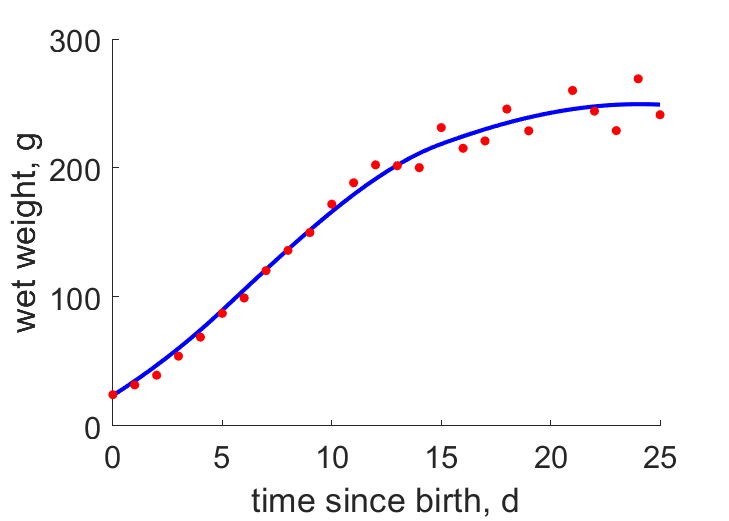Predictions & Data for this entry
| Model: std | climate: ET, Dfc | migrate: Ml | phylum: |
| COMPLETE = 2.5 | ecozone: TH | food: biCvf, biCvb, biCvm, biSv, xiHs | class: |
| MRE = 0.017 | habitat: 0iTht | gender: Dg | order: |
| SMSE = 0.001 | embryo: Tnsfm | reprod: O | family: |
Zero-variate data
| Data | Observed | Predicted | (RE) | Unit | Description | Reference |
|---|---|---|---|---|---|---|
| ab | 23 | 23.93 | (0.04053) | d | age at birth | AnAge |
| tx | 25 | 25.02 | (0.0008419) | d | time since birth at fledging | ADW |
| tp | 75 | 74.78 | (0.002903) | d | time since birth at puberty | guess |
| tR | 1095 | 1095 | ( 0) | d | time since birth at 1st brood | Furn1987 |
| am | 3710 | 3706 | (0.0009673) | d | life span | AnAge |
| Wwb | 24 | 23.55 | (0.01883) | g | wet weight at birth | Furn1987 |
| Wwi | 270 | 273.7 | (0.01353) | g | ultimate wet weight | Furn1987 |
| Ri | 0.005479 | 0.005471 | (0.001546) | #/d | maximum reprod rate | AnAge |
Uni- and bivariate data
| Data | Figure | Independent variable | Dependent variable | (RE) | Reference |
|---|---|---|---|---|---|
| tW |  | time since birth | wet weight | (0.04581) | Furn1987 |
Pseudo-data at Tref = 20°C
| Data | Generalised animal | Stercorarius longicaudus | Unit | Description |
|---|---|---|---|---|
| v | 0.02 | 0.03058 | cm/d | energy conductance |
| p_M | 18 | 1392 | J/d.cm^3 | vol-spec som maint |
| k_J | 0.002 | 0.05715 | 1/d | maturity maint rate coefficient |
| k | 0.3 | 0.3006 | - | maintenance ratio |
| kap | 0.8 | 0.9554 | - | allocation fraction to soma |
| kap_G | 0.8 | 0.8001 | - | growth efficiency |
| kap_R | 0.95 | 0.95 | - | reproduction efficiency |
Discussion
- Body temperature may only on target after 2 till 3 weeks, as discussed in Kooy2010 p 176
- mod_1: v is reduced; food availability taken variable in tW data
- mod_2: Pseudo-data point k is used, rather than k_J; Data set tp and parameter t_R are added, the latter replacing clutch interval t_N. Postnatal T is based on PrinPres1991, see get_T_Aves. See further the revision page, theme puberty
Facts
- smallest skua (Ref: npolar)
Acknowledgment
- The creation of this entry was supported by the Norwegian Science Council (NFR 255295)
Bibliography